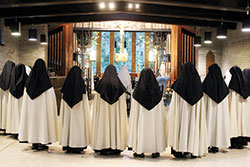Vocations Supplement
Carmelite nuns pray for the world ‘from the heart of the Church’

Members of the Discalced Carmelite Monastery of St. Joseph in Terre Haute stand during a celebration of the Mass. Prayer for the Church and the world, both communal and individual, is the primary vocation of the cloistered Carmelite community. (Submitted photo)
By Sr. Clare Joseph Daniels, O.C.D. (Special to The Criterion)
St. Teresa of Avila, foundress of the Discalced Carmelite nuns during the time of the Protestant Reformation in 16th-century Spain, wrote that her community of sisters “would all be occupied in prayer for those who would be defenders of the Church and for preachers and for learned men who protect her from attack.”
She went on to write that they were to “pray for the many souls that are being lost” (The Way of Perfection).
St. Thérèse of Lisieux, three centuries later, wrote that, “I came to Carmel to save souls and to pray for priests,” and “everything I have, everything I merit, is for the good of the Church and for souls” (Story of a Soul).
We, the Carmelite nuns of Terre Haute, stand on the shoulders of these two great saints. The Carmelite order originated in the 13th century when hermits lived in caves on Mount Carmel in the Holy Land.
These hermits eventually had to leave Mount Carmel and begin living in cities where they established monasteries. Carmelites around the world call these monasteries, “Carmel.”
As daughters of St. Teresa, we have committed our lives to prayer and sacrifice for our Church, for priests, for the salvation of souls and for our world. In our mission statement, we proclaim to “stand in the presence of the Living God and intercede for all,” and to offer “a prophetic witness of hope to the world.” This is the focus of our “life-work” for the Church—total dedication to a life of prayer.
As contemplative religious women, we do not have an external apostolic work for the Church. This means that we do not engage in works that serve the concrete needs of people in our societies, such as feeding the poor, teaching, nursing, or any other work that requires we leave our enclosed monastery.
The tangible needs of many people in our world are very great indeed and, in the sense that contemplatives pray for those needs, we have a strong apostolic “accent” to our vocation. As contemplatives, we are committed to spend more time in formal prayer than active sisters are able to, even while we all pray when actively engaged in our work or service in community.
In describing the role of Carmelite contemplatives, it may be argued that St. Thérèse said it best when she proclaimed, “my vocation is Love.” St. Thérèse had a deep desire to “be all” for the Lord— “warrior, priest, apostle, doctor and martyr.”
Drawing from St. Paul’s First letter to the Corinthians, which describes the Church as the mystical body of Christ, St. Thérèse recognized that “all the parts of the body” needed love in order to act, and so she, as a Carmelite contemplative nun, would be love in the heart of the Church. She believed that “love comprised all vocations.”
This is a good way to understand the Carmelite vocation when considering the Church as the body of Christ. The Carmelite nun prays from the very center—from the heart—of the Church.
For the Carmelite, prayer goes beyond “saying prayers.” Prayer is the nurturing of a deep interior life in which our way of living becomes prayer itself. We live more from our center, even while living in community and attending to the needs and work of the community.
The woman who joins our community is responding to a call from deep within; to a summons from our Lord to live wholly dedicated to him and to the needs of his Church, which are no less troubling today than they were in 16th-century Spain.
In Carmel, we strive to live faithfully that call to be love at the heart of the Church. We strive to be a hopeful presence to others who lack hope or who feel that they just cannot see the way ahead.
Through our witness to hope, we strive to encourage greater faith and trust in our Lord. When there is such discouragement pressing in from all sides—from our government, our Church, our families, or our work places—we remember that God alone is perfect and without sin. Standing in God’s presence, we keep prayerful vigil for all people, trusting in God and in his mercy.
Answering the call to pray, to love, to the vocation of Carmel, we strive to be faithful daughters of St. Teresa and live out her desire that we be “good friends of Christ” since he has “so many enemies and so few friends” (Way of Perfection). By responding to God’s great love for us, the commitment of our lives dedicated to prayer in community—loving our sisters, coming together as one—is but a small return for all we have received.
The inflow of our Lord’s Spirit assures us that he is always present; that he is always in the midst of everything that happens in our world—and that we have every reason to live in confidence and hope.
(Discalced Carmelite Sister Clare Joseph Daniels is a member of the Monastery of St. Joseph in Terre Haute. To learn more about her community, visit
heartsawake.org.) †
